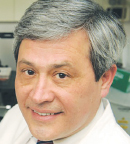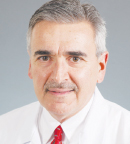
Carlos L. Arteaga, MD
“This study supports the use of neoadjuvant chemotherapy,” commented press conference moderator Carlos L. Arteaga, MD, of the Simmons Cancer Center at UTSouthwestern Medical Center in Dallas. “It did not matter whether patients received adjuvant therapy, as long as they had achieved a pathologic complete response to neoadjuvant therapy. This suggests that the impact of chemotherapy occurs early in the course of treatment, and if it is used early, the impact will persist. At a minimum, it is not worse to give neoadjuvant chemotherapy and there may be some benefits associated with it.”
He continued: “When we use neoadjuvant therapy in triple-negative breast cancers and HER2-positive breast cancers, we have good data that this increases the ability to perform breast-conserving surgery. We also get information on prognosis based on the pathologic complete response. Patients without a pathologic complete response can be put on clinical trials post-surgery and, in some cases, receive additional chemotherapy.”
The situation with estrogen receptor–positive breast cancer is “less compelling,” commented Dr. Arteaga. “We tend to use neoadjuvant chemotherapy in patients who are young and/or with high-grade and high-stage estrogen receptor–positive cancers. In many of these cases, we see tumor shrinkage, but a pathologic complete response is less frequent. This is not necessarily bad news for patients with an estrogen receptor–positive tumor, since these patients will still undergo at least 5 years of adjuvant antiestrogens to complete their treatment.”

Laura J. Esserman, MD, MBA
Following Dr. Spring’s presentation, Laura J. Esserman, MD, MBA, Director of the -Carol Franc Buck Breast Cancer Center at the University of California, San Francisco, Helen Diller Family Comprehensive Cancer Center, commented from the audience: “Presenters did a fantastic job of presenting complex data. The data show that however you get to pathologic complete response, you have a good outcome, but that additional therapy, once you have achieved complete response, does not further improve outcome. This study supports de-escalation of therapy in the neoadjuvant setting of high-risk early-stage breast cancer in patients with complete response and targeted escalation in those without complete response.”

Joseph Sparano, MD
Formal discussant of this trial, Joseph Sparano, MD, of Montefiore Medical Center, Bronx, New York, said, “The meta-analysis confirmed what we knew before [about patholotic complete response as a prognostic marker]. What is new is that the researchers have shown there is no benefit from additional chemotherapy if a patient has a pathologic complete response…. Large improvements in pathologic complete response are needed to show large improvements in event-free survival. That is still the case.” ■
DISCLOSURE: Dr. Arteaga reported no conflicts of interest. Dr. Esserman is a consultant/advisor with Blue Cross Blue Shield Association and has received research funding from Merck and reimbursement for travel, accommodations, and expenses from Blue Cross Blue Shield Association. Dr. Sparano has stock or other ownership in MetaStat; is a consultant/advisor with AstraZeneca, Lilly, Celldex, Pfizer, Prescient Therapeutics, Juno Therapeutics, Merrimack, Genentech/Roche, Celgene, and Novartis; and has received institutional research funding from Prescient Therapeutics, Deciphera, Genentech/Roche, Merck, Novartis, and Merrimack.

